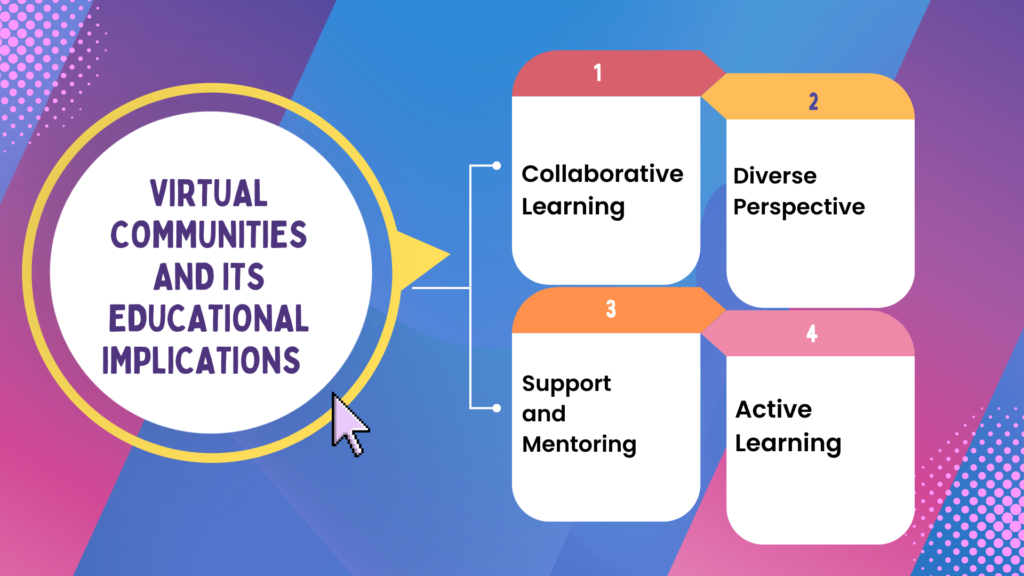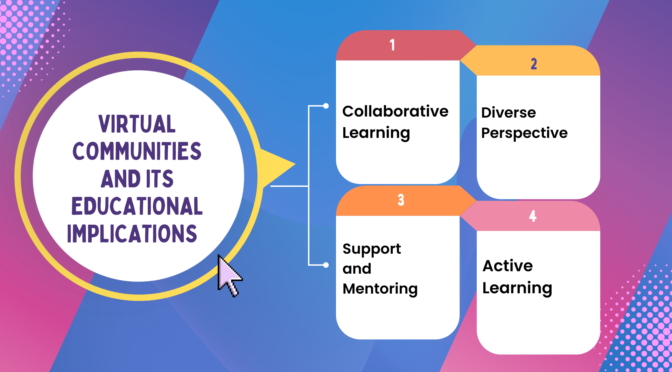Virtual communities refer to online groups or networks of individuals who share common interests, activities, or goals and interact with one another through digital communication tools. These communities can have significant educational implications, particularly in the context of online and distance learning.
- Accessible Learning Environments:
- Virtual communities provide accessible learning environments, breaking down geographical barriers. Students from around the world can participate in educational discussions and activities, promoting a diverse and inclusive learning experience.
- Collaborative Learning:
- Virtual communities facilitate collaborative learning. Students can engage in group discussions, share resources, and work on projects together, promoting teamwork and peer-to-peer learning.
- Diverse Perspectives:
- Virtual communities often bring together individuals from different backgrounds, cultures, and experiences. This diversity enriches discussions and encourages students to consider various perspectives.
- Flexibility and Convenience:
- Online virtual communities offer flexibility and convenience, allowing students to participate at their own pace and on their own schedules. This is especially beneficial for adult learners or those with busy schedules.
- Support and Mentoring:
- Virtual communities can serve as platforms for students to seek support and mentoring from peers or instructors. They can ask questions, share challenges, and receive guidance within the community.
- Social Learning:
- Learning is a social activity, and virtual communities replicate this social aspect of education. Students can engage in social learning experiences, which can enhance their understanding of the content.
- Active Learning:
- Active participation in virtual communities is often encouraged. This active engagement helps reinforce learning and retention of knowledge.
- Synchronous and Asynchronous Learning:
- Virtual communities can support both synchronous (real-time) and asynchronous (delayed) learning, accommodating different learning styles and preferences.
- Sharing of Resources:
- Members of virtual communities can share educational resources, such as articles, videos, and research materials, leading to a richer learning experience.
- Professional Development:
- Virtual communities can be used for professional development and networking. Educators can join communities related to their field to stay updated on best practices, trends, and research.
- Motivation and Engagement:
- Active participation in a virtual community can enhance motivation and engagement. Students may be more inclined to learn when they feel a sense of belonging to a supportive group.
- Feedback and Assessment:
- Instructors can use virtual communities for formative assessment by monitoring students’ participation and contributions. They can provide feedback and adjust their teaching accordingly.
- Digital Literacy:
- Participation in virtual communities helps students develop digital literacy skills, which are essential in today’s digital age.
- Building a Personal Learning Network (PLN):
- Students can build their own personal learning networks within virtual communities. These networks can be invaluable for lifelong learning and professional growth.
- Cultivating Online Citizenship:
- Virtual communities provide an opportunity to teach digital citizenship, emphasizing ethical and responsible online behavior and interaction.
- Building Communities of Practice:
- In professional and vocational education, virtual communities can serve as communities of practice, where practitioners share expertise and collaborate to advance their field.
Also Visit: Prep with Harshita

Also Read: Meaning and Concept of ICT


Terrific work! This is the type of information that should be shared around the web. Shame on Google for not positioning this post higher! Come on over and visit my site . Thanks =)
Thank you for your articles. They are very helpful to me. Can you help me with something?
I don’t think the title of your article matches the content lol. Just kidding, mainly because I had some doubts after reading the article.
Thanks for sharing. I read many of your blog posts, cool, your blog is very good.